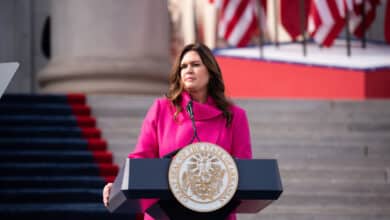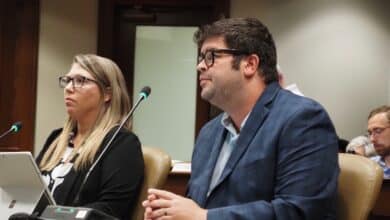Governor Sarah Sanders has called a special legislative session of the Arkansas legislature to begin Monday, September 11. Nine (9) items for consideration were included in her declaration. So far seven pieces of legislation have been filed for the special session. They include the following topics:
- Tax cuts and tax credits (HB1001/SB2)
- Moving surplus tax funds to the restricted reserve fund (HB1004/SB1)
- To prohibit COVID vaccine mandates (HB1002/SB3)
- To restrict the people’s rights to government information under the Freedom of Information Act (FOIA) and restrict the remedies for when the government refuses to provide information. (HB1003/SB7)
- To keep exterior doors closed and locked during the school day. (HB1005/SB4)
- To amend educational freedom accounts and other educational opportunity programs to allow additional funding. (SB5)
- To amend sentencing reforms made during the regular session. (HB1006/SB6)
So far, most of the attention of the special session has centered on the major changes proposed in HB1003/SB7 related to the Freedom of Information Act. FOIA expert, attorney, and law professor Robert Steinbuch joined Conduit News to break down the legislation and the impact it could have for Arkansans. Billed as a “security” fix to protect the governor and her children, the bill contains other pieces unrelated to this. The section on security is seemingly not much of an issue. The issue is with the other sections that guts the FOIA, protects government actors from transparency, and removes incentives provided to ensure that government actors adhere to the FOI law.
The session will also include legislation for tax cuts, including a one-time credit of $150 for individuals and $300 for those married and filing taxes jointly and making less than $90,000. A ban against most COVID vaccine mandates for both private and government employment and benefits will be debated. Some cleanups for felony sentencing following reforms made during the regular session earlier this year will be considered as well.
Most of the legislation will likely see limited or no opposition, but the FOIA bill is already being opposed by conservatives, moderates, and liberals across the state. From Republican county committees to leftist organizations and activists, the public is speaking out almost unanimously against the FOIA bill changes (outside of the safety protections for the Governor’s children).
Special Session Summary of Conduit Bill Analysis (see Details Below):
OPPOSE
HB1003/SB7 – Drastically Gutting the Freedom of Information Act (FOIA) – OPPOSE
SUPPORT
HB1001/SB2 – Income Tax Cuts and Income Tax Credits – SUPPORT
HB1002/SB3 – No COVID Vaccine Mandates – SUPPORT BUT WITH RESERVATIONS
Bill Details:
HB1001/SB2 – Income Tax Cuts and Income Tax Credits – SUPPORT
By: Rep. Les Eaves / Sen. Jonathan Dismang
This bill would create a one-time individual income tax credit of $150.00 for those with income below $89,600.00 ($300 for those married filing jointly). Named the “inflationary relief income tax credit” it aims to provide some relief against the Bidenflation and Bidenomics that has so negatively hurt people. This one-time credit would return about $155 million to taxpayers.
The bill would also provide a permanent tax rate cut from 4.7% to 4.4% for those making under $87,000 on their taxable income between $24,300 and $87,000. For those making over $87,000, a permanent tax rate cut from 4.7% to 4.4% for taxable income over $4,401, with bracket adjustments to avoid tax cliffs. The corporate income tax top rate (income above $11,000) would be cut from 5.1% to 4.8%. These rate cuts would save taxpayers about $153 million annually.
These tax cuts come after back-to-back years of $1 billion+ budget surpluses.
HB1002/SB3 – No COVID Vaccine Mandates – SUPPORT BUT WITH RESERVATIONS
By: Rep. Beaty Jr. / Sen. Joshua Bryant
This bill would establish a permanent ban on covid vaccine mandates, but with a huge exception. It replaces an Arkansas ban that was set to expire two years after the FDA approves a COVID19 vaccine. This ban would apply to any “public or private benefit” being made conditional upon getting the COVID vaccine or trying to coerce someone into getting the vaccine. This includes employment benefits for both private and government employees. A ban is imposed against any state/local government or official from mandating the vaccine or as a condition of employment, education, entry, services, or obtaining a licensure, certificate or permit from the state. The bill directs the department of health to maintain information and data on any potential risks and harms with taking the COVID vaccine and shall make such information publicly available.
A major new exception in this bill allows mandating the vaccine by a state/local government actor to secure federal tax dollars for the state/local government if permission is granted by the legislative council of the Arkansas legislature. Unfortunately, this means Arkansas and its political subdivisions may seek approval to impose COVID mandates anytime the Biden administration offers federal money for imposing COVID mandates or threatens to withhold federal money unless a COVID mandates are imposed. The exception can be described as “money for mandates.”
The bill contains an emergency clause, making it effective upon passage and signature by the Governor.
HB1003/SB7 – Drastically Gutting the Freedom of Information Act (FOIA) – OPPOSE
By: Rep. David Ray / Sen. Scott Flippo
FOIA expert, attorney, and law professor Robert Steinbuch joined Conduit News to break down the legislation and the impact it could have for Arkansans. As Prof. Steinbuch points out, it has potential for being the “Rapist Protection Act” because of its far-reaching effects to shield information. The bill could change FOIA to exclude from public disclosure everything from the governments conduct and responses to sexual molestation of students to the special interests involved in crafting and drafting government programs, rules, and regulations.
The bill also undermines the current incentives in place to ensure that governments follow the FOIA law and timely and accurately respond to requests from the public. Specifically, it would strip the incentive that those who must sue a government actor to get information could no longer be reimbursed for their attorney fees for having to take the government to court to force disclosure. A complete ban against reimbursement of attorney fees would apply for those having to sue an elected state officer or state employee to force compliance with the law.
A near blanket exemption for any records of state government actors and their communications, memos, opinions, recommendations, deliberations, or ANY items that any government actor deems is a record that could be part of litigation. According to Steinbuch, no members of the FOIA task force who regularly consider potential changes to the FOI law were contacted regarding the bill.
As written, this bill could be one of the most disastrous changes for government transparency in Arkansas history.






